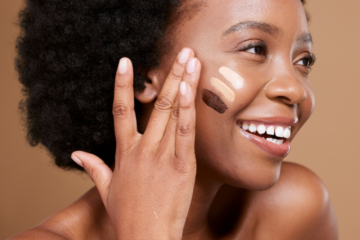Dark scars often become an unwelcome part of our skincare journey, affecting not just our skin’s appearance but also our confidence. Understanding how to get rid of dark scars—and knowing which treatments to trust—can be a game-changer in your skincare routine. In this guide, we’ll explore the root causes of dark scars, the most common types, and five professional treatments recommended by dermatologists. We’ll also discuss effective home remedies and lifestyle practices for scar prevention. By the end, you’ll have a clearer understanding of how to achieve healthier, scar-free skin.
Understanding the Root Cause of Dark Scars
Dark scars, often resulting from skin trauma, can be both physically and emotionally distressing. The discoloration occurs when injured skin produces excess melanin during the healing process, known as hyperpigmentation. Post-inflammatory hyperpigmentation (PIH) is a common type of dark scar that forms after an acne breakout, injury, or inflammation. Atrophic scars, on the other hand, appear as depressions in the skin often caused by severe acne or chickenpox.
Identifying the type of scar is crucial for selecting the most effective treatment. Dark scars impact not only your skin’s appearance but also your confidence. Recognizing their root cause and knowing the available treatments is essential to achieving smooth, even-toned skin.
Common Types of Dark Scars
Post-Inflammatory Hyperpigmentation (PIH)
Post-inflammatory hyperpigmentation (PIH) occurs when an injury or inflammation causes excess melanin production. This leads to dark spots on the skin, commonly seen after acne breakouts. PIH can affect all skin types, but it is especially prevalent in darker skin tones due to higher melanin levels.
Atrophic Scars
Atrophic scars are indentations or depressions in the skin. They often result from severe acne, chickenpox, or other conditions that damage collagen and elastin fibers. These scars can be challenging to treat and require targeted therapies to improve skin texture and tone.
Hypertrophic and Keloid Scars
Hypertrophic and keloid scars are raised, thickened areas of skin formed by excessive collagen production during the healing process. While hypertrophic scars remain within the boundaries of the original wound, keloid scars can extend beyond it, becoming larger over time.
Professional Treatments for Dark Scars
When it comes to treating dark scars, professional advice is invaluable. Here are five dermatologist-approved treatments that can help you achieve smoother, even-toned skin:
Chemical Peels
Chemical peels involve applying a solution to the skin that exfoliates the outer layer, promoting cell turnover and revealing fresher, brighter skin beneath. According to Dr. Elena Moreno, “Professional assessment is key for determining the most effective treatment for dark scars. What works for one person may not work for another.” Chemical peels can vary in strength, from superficial peels with minimal downtime to deeper peels that require a recovery period. Dermatologists tailor the treatment to your skin type and scar severity.
Microdermabrasion
Microdermabrasion is a minimally invasive procedure that uses a special device to gently sand away the top layer of skin, stimulating collagen production and improving skin texture. This treatment is particularly effective for mild scarring and hyperpigmentation. The procedure involves little to no downtime, making it a convenient option for those with busy schedules. Multiple sessions may be needed to achieve optimal results.
Laser Therapy
Laser therapy targets dark scars by using focused light energy to break down excess melanin and stimulate collagen production. Dr. Raj Patel advises, “Be wary of over-the-counter treatments promising quick fixes. Many lack the potency to effectively treat dark scars.” Different types of lasers are used depending on the scar type and skin tone. Fractional lasers are commonly used for atrophic scars, while Q-switched lasers are effective for PIH.
Topical Prescriptions
Dermatologists often prescribe topical treatments containing ingredients like hydroquinone, retinoids, and corticosteroids to lighten dark scars and promote skin regeneration. These prescriptions are tailored to your specific needs and skin type. Topical prescriptions can be highly effective but require consistent use over several weeks or months to see noticeable improvements. Combining these treatments with other professional therapies can enhance results.
Microneedling
Microneedling involves using a device with fine needles to create tiny punctures in the skin, stimulating collagen and elastin production. This treatment is effective for improving skin texture and reducing the appearance of atrophic scars. Dr. Aisha Khan recommends, “Consistency is key for at-home treatments. Daily application of recommended products can significantly improve the appearance of dark scars over time.” Microneedling can be combined with other treatments like serums or platelet-rich plasma (PRP) for enhanced results.
Effective Home Remedies and Lifestyle Practices
While professional treatments are highly effective, there are also several home remedies and over-the-counter options that can help reduce the appearance of dark scars.
Retinoids
Retinoids are vitamin A derivatives that promote cell turnover and collagen production. They are available in both prescription and over-the-counter formulations and are effective for treating hyperpigmentation and improving skin texture. Consistent use of retinoids can lead to smoother, more even-toned skin. However, they can cause dryness and irritation, so it’s essential to follow usage instructions carefully.
Vitamin C Serums
Vitamin C is a powerful antioxidant that brightens the skin and reduces hyperpigmentation. Incorporating a vitamin C serum into your daily skincare routine can help fade dark scars and improve overall skin radiance. When selecting a vitamin C serum, look for stable formulations with concentrations between 10% and 20% for optimal effectiveness. Apply the serum in the morning to protect your skin from environmental damage.
Silicone Gel Sheets
Silicone gel sheets are a popular over-the-counter treatment for raised scars. They create a protective barrier over the scar, keeping it hydrated and promoting collagen regulation. Silicone gel sheets are effective for both hypertrophic and keloid scars. Consistent use of silicone gel sheets can flatten and soften raised scars over time. They are easy to use and can be worn discreetly under clothing.
Lifestyle Practices for Scar Prevention
Preventing dark scars is just as important as treating existing ones. Here are some lifestyle practices to help you maintain healthy skin and prevent future scarring:
Sun Protection
“Protecting your skin from the sun is crucial. UV rays can darken scars and exacerbate hyperpigmentation,” highlights Dr. Sophia Lee. Always apply a broad-spectrum sunscreen with an SPF of 30 or higher, even on cloudy days. Wearing protective clothing, such as wide-brimmed hats and long sleeves, can also shield your skin from harmful UV rays. Seek shade whenever possible, especially during peak sun hours.
Gentle Skincare Routine
Using harsh or abrasive skincare products can worsen scarring and irritation. Opt for gentle cleansers, moisturizers, and exfoliants that are suitable for your skin type. Avoid picking at scabs or blemishes, as this can lead to further scarring. A consistent skincare routine that includes cleansing, moisturizing, and protecting your skin will help maintain its health and resilience.
Healthy Diet and Hydration
A balanced diet rich in vitamins and antioxidants supports skin health and healing. Foods high in vitamins A, C, and E, as well as omega-3 fatty acids, can promote collagen production and repair damaged skin. Staying hydrated by drinking plenty of water helps keep your skin plump and supple, reducing the likelihood of scarring.
Achieve Healthy, Scar-Free Skin
Dark scars can be frustrating, but with the right treatments and lifestyle practices, you can achieve smoother, even-toned skin. Professional treatments like chemical peels, microdermabrasion, laser therapy, topical prescriptions, and microneedling offer effective solutions for various types of dark scars. Additionally, incorporating home remedies and over-the-counter treatments like retinoids, vitamin C serums, and silicone gel sheets can enhance your skincare routine. Preventing future scarring with sun protection, a gentle skincare routine, and a healthy diet are equally important.
If you’re ready to take the next step in your skincare journey, consider consulting with a dermatologist to determine the best treatment plan for your unique needs. Remember, achieving healthy, scar-free skin is a gradual process that requires patience and consistency. For personalized skin care advice and expert recommendations, book a consultation with one of our dermatologists today. Let’s work together to reveal your most radiant, confident self.
The Importance of Patience and Consistency
Achieving noticeable improvements in the appearance of dark scars requires patience and persistence. Many treatments, whether professional or at home, can take several weeks or even months to deliver optimal results. It’s essential to set realistic expectations and remain committed to your skincare regimen. Dr. Aisha Khan emphasizes, “Understanding that skin healing is a gradual journey helps you navigate your treatment plan with a more positive outlook.” Regular follow-ups with your skincare professional can not only help track your progress but also make necessary adjustments to your routine to ensure that you are getting the best outcomes.
Maintaining Results Over Time
Once you have achieved the desired results in lightening dark scars, it’s important to maintain your skin’s health to prevent new scars from forming. This includes ongoing sun protection, consistent use of your skincare products, and adherence to a healthy lifestyle. Additionally, consider periodic treatments to sustain your skin’s quality and appearance. Regular consultations with a dermatologist will allow you to adapt your skincare strategies according to your skin’s evolving needs. Keeping your skin well-nourished and protected is key to long-lasting radiance and confidence.
Psychological Impact of Scarring
The presence of dark scars can significantly affect an individual’s self-esteem and emotional well-being. Many people may feel self-conscious or embarrassed about their scars, leading to anxiety in social situations. Dr. Emily Carter notes, “The psychological impact of scarring can be profound, as it can influence how individuals perceive themselves and interact with others.” It’s important to acknowledge these feelings and seek support when necessary. Speaking with a therapist or joining support groups can provide comfort and strategies for coping with the emotional aspects of scar visibility.
Embracing Your Skin Journey
As you embark on your journey to achieve healthier skin, remember that each person’s experience is unique. It’s essential to embrace your skin’s characteristics and the story it tells. Whether through treatments, lifestyle changes, or emotional support, honoring your skin journey can cultivate a more positive relationship with your body. Celebrate small victories along the way, and don’t hesitate to showcase your beautiful, resilient self as you progress towards your skin goals. Embracing imperfections can also empower you and inspire others facing similar challenges. Ultimately, prioritizing both physical and mental skin health is crucial for a holistic approach to beauty and well-being.
Seeking Professional Guidance
Navigating the complexities of skin health and scar management can be overwhelming, but seeking professional guidance can provide clarity and direction. Dermatologists and skincare specialists are equipped with the knowledge to assess your skin type, identify underlying concerns, and recommend tailored treatments that align with your goals. Whether you’re considering advanced procedures or exploring holistic approaches, professional input can ensure you make informed decisions that enhance your skin’s health. Don’t hesitate to discuss your concerns and ask questions during consultations—an open dialogue can foster a collaborative approach to healing and help you feel more confident in your skin journey.
Building a Supportive Skincare Community
Connecting with others who share similar skin concerns can be incredibly beneficial. Building a supportive community, whether through online platforms or local groups, allows you to exchange experiences, tips, and encouragement. Sharing your journey with others not only helps normalize the challenges associated with scarring but also promotes a sense of camaraderie and understanding. By surrounding yourself with positivity and support, you can cultivate a more empowered mindset that fosters both physical and emotional healing. Engage in forums, social media groups, or local meetups to create meaningful connections that uplift and inspire.
The Role of Diet in Skin Health
A well-balanced diet plays a crucial role in maintaining healthy skin and can significantly impact the healing process of dark scars. Nutrients such as vitamins C and E, zinc, and omega-3 fatty acids contribute to skin repair and resilience. Incorporating a variety of fruits, vegetables, lean proteins, and healthy fats into your meals can promote collagen production and cell regeneration. Dr. Mia Patel stresses, “Nutrition is a vital component of skin care; what we consume reflects on our skin’s health.” Staying hydrated is equally important, as water helps to flush toxins and maintain skin elasticity. Consider keeping a food diary to track your intake and identify any dietary changes that may benefit your skin. Making mindful choices towards nutrition can enhance not only your skin’s appearance but also your overall well-being, leading to a more vibrant and confident self.
The Impact of Stress on Skin
Stress is another factor that can negatively affect your skin’s condition, exacerbating issues such as inflammation and scarring. High stress levels can lead to hormonal imbalances, triggering breakouts or worsening existing scars. Incorporating stress-reduction techniques into your daily routine can be immensely beneficial for both your mental and skin health. Activities such as yoga, meditation, deep breathing exercises, and spending time in nature can help alleviate stress and promote relaxation. Furthermore, don’t hesitate to seek therapeutic support if you find stress management challenging. By prioritizing mental well-being, you are nurturing your skin’s ability to heal and thrive, paving the way for a healthier and more radiant complexion.
Understanding Skin Types and Their Needs
Every individual’s skin is unique, and understanding your specific skin type is vital for effective care and treatment. The main skin types include oily, dry, combination, sensitive, and normal. Each type has distinct characteristics and requires tailored products and routines. For instance, oily skin may benefit from lightweight, non-comedogenic moisturizers and exfoliants, while dry skin often needs richer, hydrating formulations to combat flakiness. Dr. Sarah Lin suggests conducting a patch test or consulting with a dermatologist to determine your skin type accurately. This knowledge empowers you to select appropriate products that cater to your skin’s needs, ensuring optimal results in your journey to achieve radiant and healthy skin. Remember, consistency in your routine, coupled with an understanding of your skin’s requirements, will greatly enhance the effectiveness of your skincare efforts.





